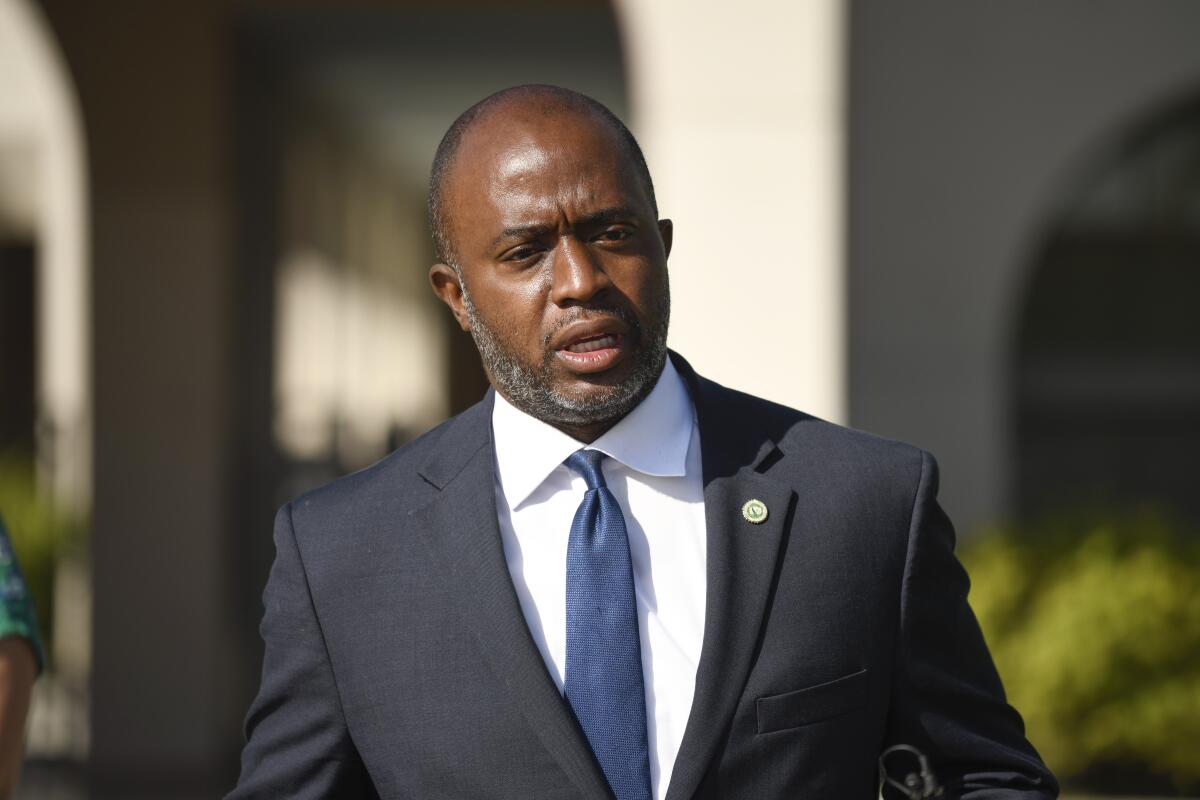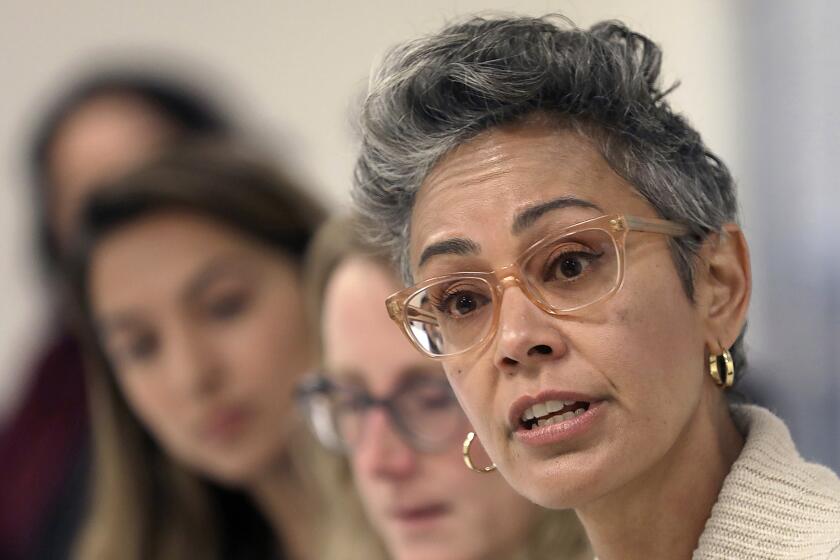California’s schools chief could cruise to a second term, despite criticism

SACRAMENTO — Prolonged classroom shutdowns. Pandemic policies that at times frustrated parents and teachers alike. Allegations of a toxic workplace. Questionable hiring practices.
Despite it all, state Supt. of Public Instruction Tony Thurmond could end up coasting into reelection.
“People are still angry, and they need to be heard. And I’m listening,” Thurmond said in an interview with The Times. “We’ve got a lot of big problems ahead of us, but I feel uniquely qualified to move our students forward, and I’m hopeful that the California voters will give me that opportunity to continue.”
Six candidates have filed to run against Thurmond for a four-year term as the leader of California schools in the June 7 primary. But none have the political advantages — the name recognition, funding or endorsements — of the incumbent. Unlike other state offices, a candidate for superintendent can win the job in the primary, without an election in November, by getting a majority of the vote.
Although the recall of three school board members in San Francisco this year showed that COVID-19 school frustrations have fueled voters, there are no signs of a similar effect on the superintendent race.
The influential California Teachers Assn., which praised Thurmond as “a fierce advocate for public education” in a statement, has put more than $1 million into an independent expenditure committee to reelect him. Thurmond’s campaign contributions have reached $1.4 million — an amount at least 25 times larger than that of any other candidate in the race.
Other endorsements for the incumbent include Gov. Gavin Newsom, the California Democratic Party and dozens of other prominent party officials including House Speaker Nancy Pelosi.
But that support obscures what Thurmond admits has been a “tough two years” on the job.
Among the criticisms he has faced since being elected as superintendent in 2018 after four years as a Bay Area Assembly member is a lack of influence and action during one of the most stressful times in education history. While superintendents in other states were leading the charge on COVID-19 school policies, Newsom was often the one briefing the public on distance learning and reopening, with Thurmond missing from some major announcements.
There’s also been criticism unrelated to the pandemic.
The California Department of Education grappled with a turnover problem last year as dozens of top officials fled the agency, some painting Thurmond as a toxic boss. His decision to quietly hire a friend living out of state as a top official led to at least two resignations.
“I’ve had to have tough conversations with myself. I have to ask myself every day, ‘What could I have done differently, and how do I be a better leader?’” Thurmond said when asked about those issues. “My job as a leader is to take tough feedback all the time. It helps me to grow. I continue to reflect on those things.”
Julie Marsh, a faculty director at Policy Analysis of California Education, a nonpartisan research firm, called the superintendent’s job “an unusual role,” as most other states appoint someone in lieu of leaving it up to voters. And a lack of interest in the race is not unique to this primary, she said.
In a poll commissioned last year by PACE, 46% of voters selected “don’t know” when asked about Thurmond’s performance. Comparatively, only 5% said they didn’t know how to rate Newsom.
Critics said the members had misplaced priorities and put progressive politics over the needs of children during the COVID-19 pandemic.
The superintendent oversees the California Department of Education and chairs the State Board of Education, which adopts school guidance, though locals control much of what happens in the 1,000-plus school districts.
“The position doesn’t have a lot of power or hold a lot of influence,” Marsh said. “There’s no legislative authority. They can take positions on bills and publicize issues, provide guidance, but it’s really the governor, the Legislature, and the [state] school board.”
Thurmond’s challengers are George Yang, a former Republican candidate for lieutenant governor; Lance Christensen, an education and government affairs director for the conservative California Policy Center; Marco Amaral, a special education teacher; Joseph Campbell, a Montessori schools advocate; Jim Gibson, a former Vista Unified school board member; and Ainye Long, a math teacher.
Christensen believes that disappointed parents will show up at the polls. He is running against Thurmond on a campaign that promotes parent influence, criticizes teachers’ unions for what he describes as their outsize political power and echoes conservative talking points about critical race theory.
“If there was a silver lining with the pandemic, it’s that parents have finally seen behind the curtain and it’s not in line with the goals they have for their kids’ education,” Christensen said. “I’m surprised no one else wanted to jump in, in a year where education was the top issue. Anybody who’s watched Tony Thurmond has seen a circus.”
While the job is identified as nonpartisan, the odds are against anyone who doesn’t have the backing of leading Democrats. California voters have not elected a Republican to a statewide office since 2006.
Despite some outcry, polling released last month by the nonpartisan Public Policy Institute of California showed that 73% of public school parents approve of Newsom’s handling of K-12 education. More than 4 in 10 parents reported their child has fallen behind academically during the pandemic, though.
Thurmond’s reelection campaign centers on a plan to “heal” students from pandemic fallout, proposing scholarships to promote more interest in mental health counselor jobs and setting a 2026 goal that all California students know how to read by the third grade.
“During the pandemic, many parents made the ultimate sacrifice of having to support their kids’ education, and in some cases give up their jobs, and they feel like they’ve never gotten so much as a thank you,” Thurmond said. “So when I talk to parents, that’s where I start: thanking them for what they’ve done during this really challenging time. How do we build their trust?”
Amaral, the special education teacher, is in many ways Christensen’s opposite. A self-proclaimed anti-establishment “leftist independent,” Amaral is pushing for a $70,000 minimum teacher salary, an end to military recruitment in schools and an expansion of ethnic studies.
While Amaral voted in 2018 for Thurmond, who he called “the sweetheart of the Democratic party,” he says that for too long, the position has not lived up to its potential.
“If you have the bully pulpit, you need to be the bully. You need to actually use it in order to keep the governor and the Legislature accountable,” Amaral said. “What has historically occurred is that the state superintendent is a symbolic position that goes along to get along.”
Kevin Gordon, an education lobbyist in Sacramento who represents superintendents, said there’s “virtually zero chance” that Thurmond loses, calling it a “sleeper race.”
“Frankly, there’s a whole lot of people in the education community that have stuck by him,” Gordon said of Thurmond. “At the end of the day, any unflattering issues that we saw didn’t rise to the level of putting him in jeopardy. His base is still with him, and there just wasn’t any interest in taking him on.”
More to Read
Sign up for Essential California
The most important California stories and recommendations in your inbox every morning.
You may occasionally receive promotional content from the Los Angeles Times.












